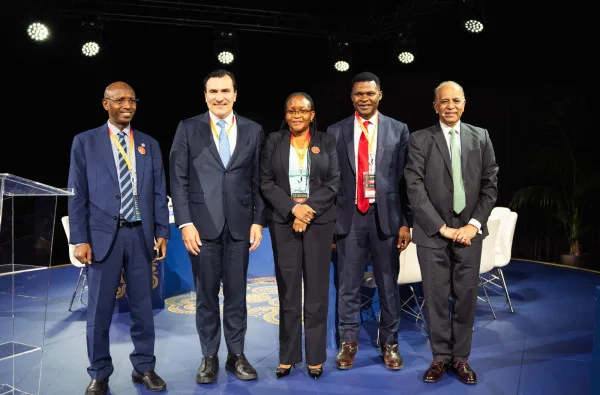
The second day of African Energy Week (AEW) 2023 – organized by African Energy Chamber (www.EnergyChamber.org) – featured a roundtable hosted by inter-governmental organization, the International Energy Forum (IEF). The roundtable featured a diverse lineup of industry leaders who examined how Africa can leverage its energy markets to achieve its UN Sustainable Development Goals and COP28 objectives by 2030.
Global energy and climate policies, impacted by successive shocks, now pose risks to energy security and just transitions. As such, the roundtable highlighted dialogue and collaboration as essential strategies to mitigate trade and investment hurdles, ensuring market predictability and affordability for a sustainable future.
“If we dare to isolate Africa, we will be making a big mistake. We always think global and act global, but we have to be careful when we see resources just go out and become unable to use those resources to empower Africans and create value,” stated NJ Ayuk, Executive Chairman of the AEC, adding, “We need to level the playing field when it comes to driving market conditions.”
The roundtable went on to discuss Africa’s pivotal role in global supply chains and its energy landscape, with the speakers shedding light on Africa’s energy challenges and how the continent can seize opportunities in the energy transition.
“We kicked off our global energy solutions last year at AEW 2022 and we wanted it to be a review of the lessons learned from the energy crisis, but also what’s working and not working in terms of the energy transition,” stated Joseph McMonigle, Security General at IEF, adding, “The singular linear, one-size-fits-all approach to net-zero is outdated and misguided, and what we need is a multi-dimensional approach that implements multiple starting points and pathways that allows countries to use their capital resources and expertise.”
It was noted during the session that cooperation and collaboration will be essential to addressing the challenges posed by the dual objectives of securing energy supply while transitioning to cleaner and more sustainable energy sources. By fostering dialogue and working together, the speakers indicated that the continent will be well-positioned to develop strategies that ensure a stable energy supply while promoting and supporting the adoption of renewable energy technologies.
“The conversation around the energy transition has moved away from a one-size-fits-all approach to recognizing that there are several pathways to the transition. These pathways look different for everyone, from the global north to the global south to within individual countries. Key fundamental issues to consider are that whatever solutions you bring to the table, better meet full criteria: is it affordable, is it accessible, and is it sustainable?” prompted Proscovia Nabbanja, CEO of Uganda’s state-owned, Uganda National Oil Company Limited.
For many African countries, oil revenues continue to play a significant role in their economies. However, fluctuations in oil prices can pose economic challenges. As such, the roundtable highlighted optimal production as key to promoting energy reliability and economic growth while driving sustainable development. The speakers addressed the skills gap in Africa and underlined local content development as a key opportunity to embrace a sustainable and prosperous energy future.
“We can’t industrialize without energy,” stated Dr. Omar Farouk Ibrahim, Secretary General of continental energy organization, the African Petroleum Producers’ Association, adding, “Fossil fuels, oil, and gas are reliable, affordable, and readily available. The conversation on limiting emissions is not just, it’s not fair, because we all seem to concentrate on current operations in emission.”
The session concluded with the panelists discussing the importance of local content development as a key strategy towards advancing sustainable energy development. It was noted that pushing for inclusivity and pushing for an agenda that considers Africa’s vulnerabilities and opportunities will be imperative for the continent to utilize its natural resources in a manner that is sustainable, equitable, and fair.
#AEW2023 takes place this week in Cape Town under a mandate to make energy poverty history by 2030. Keep following www.AECWeek.com for more exciting information and updates about Africa’s premier energy event.
Distributed by APO Group on behalf of African Energy Chamber.

